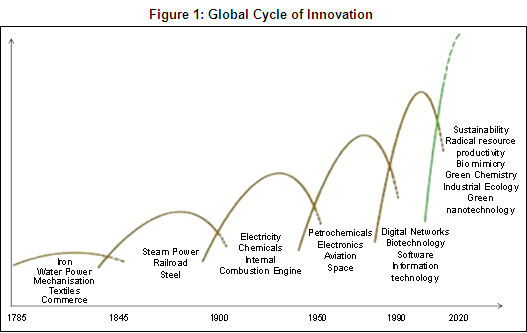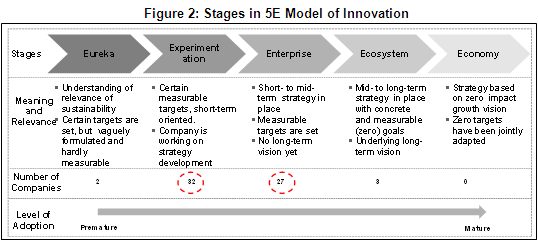所属部署 研究第四部 インドグループ
氏名:LatikaLakhani
ゼロノーツ(Zeronauts)とは、英国人実業家ジョン・エルキントン氏が、その著作「ゼロの時代 (The Zeronauts)」で提唱したコンセプトで、「富を築きつつ、環境、社会、経済への負の影響をゼロにすべく尽力する企業・事業者」を指す。同氏は企業の社会的責任(CSR)で極めて著名な研究者で、これまでもCSRに関する数々のコンセプトを提唱し、日本を含む先進国の経営幹部に多大な影響を与えている。本コンセプトは人口増加、資源不足、環境破壊など人類が将来的に直面する課題に対応するために、企業が進めるべき行動とは何かを示しており、企業活動の方向性を検討する上で重要な考え方の一つである。
“The Zeronauts” implies a new breed of innovators who are working to drive major global problems such as carbon, waste, toxics, and poverty to zero. It is used for individual inventor, innovator, entrepreneur, intrapreneur1, investor, manager or educator as well as the institutions, organizations and corporations who are driving significant changes in this area.
The term is also used for someone who finds, investigates, and develops breakthrough, footprint-shrinking solutions for the growing tensions between demography, consumerist lifestyles, and sustainability; and Political leader or policymaker who helps to create the regulatory frameworks and incentives needed to drive related “1-Earth” solutions to scale. The concept was introduced by John Elkington, world’s renowned evangelist for corporate responsibility and sustainable development.
The concept of Zeronauts emphasises the role of sustainability in the business including optimization of financial resources, human resources and natural resources and maintaining a balance between financial returns, benefits to the current generation and future generation.
Given the limited natural resources for fulfilling global needs of water, energy and health, and fast pacing globalization, the innovation is evolving from basic products and solutions in 1900s to sustainable, green and ecological solutions in 2020.
The Zero targets in current business scenario imply efforts to reduce carbon emissions, defects in production and waste to zero. However, Zeronauts assert that current capitalism has certain areas of improvement which are extensions of pioneering Japanese concepts of total quality management. Apart from the continuous improvement, there is scope of transformational change in mindsets, behaviours, cultures, economic formulae, business models, and technologies.
Scarcity of resources along with increasing urbanization is the leading trend in global economy. The decade to 2020 is termed as “Detox Decade” which includes innovation at 5Cs (Citizens, Corporations, Cities, Countries, and Civilizations). Although few innovations breakdown (don’t lead to successful results) or are incremental changes, innovations by Zeronauts work towards breakthrough/major changes.

Source: UN Conference on Sustainable Development, the Zeronauts
Zeronauts are identifying challenges that matter to future generations and exploring business models in five major areas: Pollution, Poverty, Population growth, Pandemics and Proliferation. Majorly NGOs, academic/research institutes and government organizations are working towards poverty, population growth and proliferation goals. Pollution including energy efficient is the relevant agenda for corporations. Examples of leading Zeronauts are:

Source: UN Global Impact, Survey of 64 companies from 10 core industries and 25 sectors
that define industrial production such as oil & gas, electricity conducted by Deloitte in 2012
United Nations defines development stages of Zeronauts by “5E Model of Innovation” (Figure 2). Currently, most companies are at the experiment and enterprise stage and are working to make a bigger impact in the ecosystem/value chain and economy. This implies that Zeronauts will gain significance as an economic trend as its level of adoption evolves from premature to mature.
Zeronautics is an evolving discipline of conceiving, designing, engineering and operating technologies, business models, value chains and economies that are not destructive rather they are actively restorative. Zeronauts proposes to leverage the power of game changing ideas that are relevant for future business scenario. Thus, various new disciplines such as green chemistry, natural capitalism, cradle to cradle design and biomimicry are evolving and the related markets such as Net zero buildings market (USD 1.3 trillion by 2035) will offer huge potential.
However, it is important to determine the readiness of the companies through measuring “Future quotient” and drive towards zero leads to overall increase in efficiency of the business operations. Thus, it won’t be an exaggeration if we expect to see “Chief Zero Officers” (CZOs) who are targeting to reducing waste, carbon emission, and defects to zero strategically as well as operationally.
.Note: 1 Intrapreneur is a person within a large corporation who takes direct responsibility for turning an idea into a profitable finished product through assertive risk-taking and innovation. Coined in the 1980s by management consultant Gifford Pinchot, innovative companies uses and promotes such people in the organization.
機関誌「日立総研」、経済予測などの定期刊行物をはじめ、研究活動に基づくレポート、インタビュー、コラムなどの最新情報をお届けします。
お問い合わせフォームでは、ご質問・ご相談など24時間受け付けております。